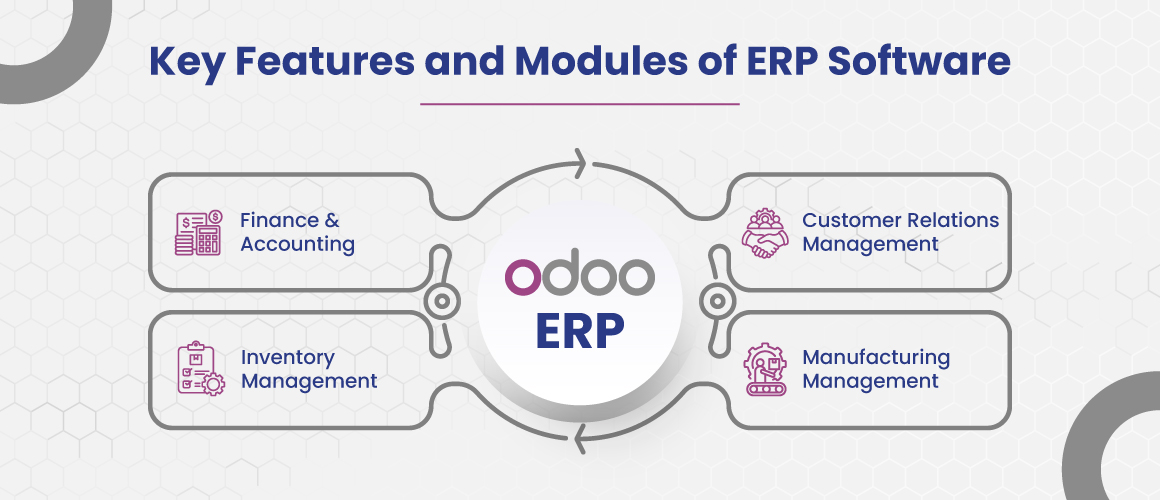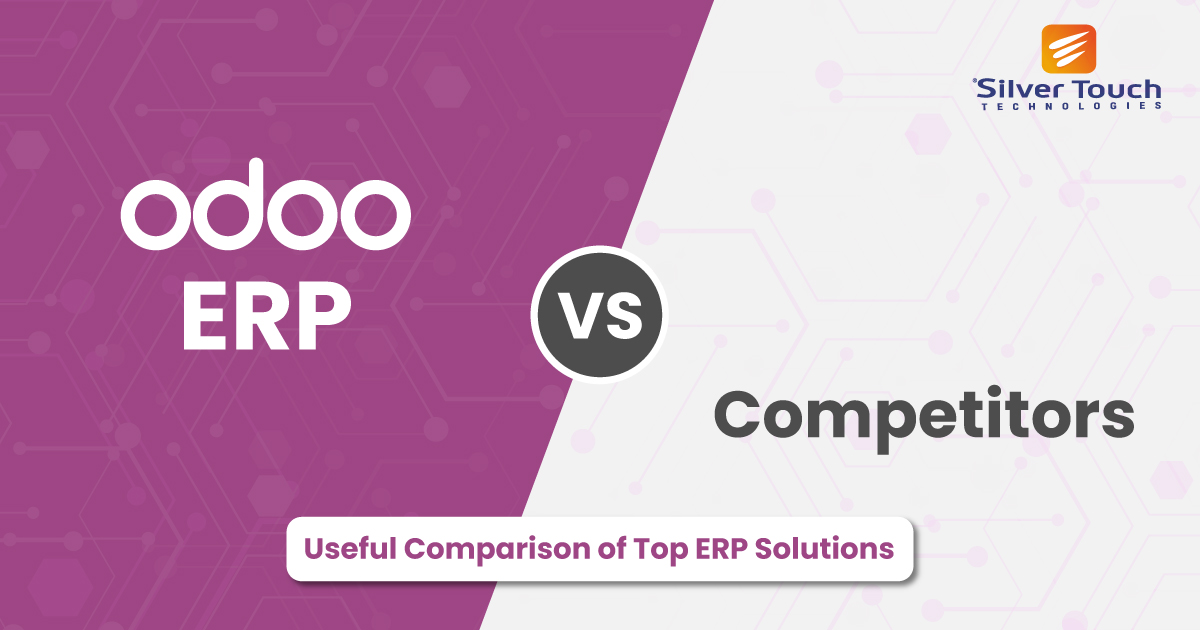Modern businesses face many challenges and intense competition in this digital age. An Enterprise Resource Planning (ERP) system acts as its integrated backbone to address these challenges. Advanced ERP solutions can streamline various business processes to drive growth. However, it is necessary to choose the right ERP from various available options like Oracle NetSuite, Odoo, and SAP.
This blog compares Odoo ERP with its major competitors. This comparison will help businesses choose the most suitable ERP solution. Let’s start with delving into the importance of flexible and scalable ERP solutions in modern businesses.
Importance of Flexible, Scalable ERP Solutions
These days, businesses witness tremendous pressure due to various circumstances and a competitive scenario. In this situation, it is essential to simplify complexities of various business processes and unify the on a single platform. A flexible, scalable, and feature-rich ERP solution makes it possible while meeting unique business needs effectively. It supports business growth by handling increased workload and preventing shortcomings over the period.
Furthermore, solutions like Odoo ERP are highly flexible and customizable to meet evolving business requirements. Such flexible ERP systems enable businesses to adapt to new regulations and market trends quickly. As the central data platform, a flexible ERP solution promotes digital transformation and automation with the help of emerging technologies like AI, ML, and Internet of Things (IoT).
Key Features and Modules of ERP Software
An ERP software has a modular structure, and each component acts as a feature to manage a particular business function in a centralized database. Here is a glimpse of the core features and modules of ERP solutions

Finance & Accounting
Its primary function is to manage all transactions and ensure regulatory compliance. This module has features like Accounts Payable (AP), General Ledger (GL), Accounts Receivable (AR), and Taxation.
Inventory Management
It monitors and controls inventory, work-in-progress (WIP), and finished goods across multiple locations or warehouses. It has features like stock tracking, cycle counting, and reorder point management.
Customer Relations Management
This module manages all interactions and relationships with existing and prospective customers. It has features like contact management, customer service management, and sales automation
Manufacturing Management
It plans, executes, and monitors the production process effectively. This module has useful features, including Bill of Materials (BoM), Material Requirement Planning (MRP), and shop floor control.
Apart from this, an ERP system has a centralized database, process automation, and real-time reporting features that can enhance the value of modern businesses. Odoo ERP is a robust solution that has all these and other features beneficial for the growth of businesses. Let’s compare it with other major ERP solutions based on features.
Key Competitors of Odoo ERP
Odoo is a robust ERP that withstands increasing competition in the segment. The primary competitors of this solution are SAP (SAP Business One and S/4HANA) and Oracle NetSuite. All these are established systems that cater to mid-to-large enterprises. Apart from these ERP giants, the Odoo ERP solution competes directly with cloud-native solutions like Acumatica and ERPNext. These solutions compete with Odoo in SMB-related capabilities and features.
Odoo ERP vs. Competitors- Feature-by-Feature Comparison
Here, we give a feature-wise, detailed comparison of Odoo ERP with its key competitors. We consider five factors for comparing these ERP solutions. They are-
Architecture
Odoo ERP
It has a modular and open-source architecture. Odoo ERP is a suite of integrated applications to perform various business activities.
Competitors
Most of its competitors are more monolithic or component-based traditionally. They are available in proprietary and license-based models.
Target Market
Odoo ERP
This ERP is ideal for SMEs with scalability for larger enterprises. It is highly useful in various sectors, including eCommerce, retail, and light manufacturing.
Competitors
NetSuite is useful for large and complex operations, whereas SAP B1 is beneficial in established SMEs or mid-sized organizations.
Customization
Odoo ERP
It has extremely high customization thanks to a modular structure. The open-source nature of this ERP enables developers to customize it at the code level effectively.
Competitors
They offer moderate to high customization facilities and require specialized tools. It is fair to mention that customization in these ERP solutions is more complex and costlier than Odoo.
Pricing Model
Odoo ERP
It is available in two models- Freemium, which is a free Community Edition with basic features, and Subscription-based Enterprise Edition with all the advanced features.
Competitors
All these ERP solutions are subscription-based per user. They need higher upfront and TCO (Total Cost of Ownership) than Odoo ERP.
Core Functionality
Odoo ERP
It covers all the aspects, ranging from accounting and inventory to non-traditional ERP functions, including eCommerce and POS.
Competitors
SAP and NetSuite solutions excel in financial management, supply chain management, and distribution. However, they need third-party tools for eCommerce or website functions.
Apart from these factors, Odoo ERP boasts strong native integration capabilities across all Odoo apps, as well as thousands of community- or partner-developed integrations. Though SAP solutions also offer strong native integration within their ecosystem, they need specific connectors or complex APIs for integrating with third-party applications.
Why Businesses Prefer Odoo ERP
Odoo ERP solutions offer an excellent combination of affordability, modular flexibility, and integration capabilities. Its free Community Edition is a robust starting point for startups. Moreover, its per-user Enterprise Edition model is also cost-efficient and offers reduced TCO as compared to legacy systems. Odoo ERP has a modular architecture that enables companies to start small with one or two applications and add hundreds of fully integrated modules later.
How to Choose the Right ERP for Your Business
Businesses must choose the right ERP solution to leverage its benefits for driving growth and transformation. This selection is a strategic evaluation for enterprises based on their business needs, complexity of processes, budget, and growth trajectory. Entrepreneurs can start with a thorough requirement analysis to identify core necessities across different departments. Here, business size also matters in selecting the most viable option.
Secondly, it is necessary to examine the TCO closely because it includes customization, training, implementation, and other related costs. It is crucial to select an ERP solution that has a proven track record in your specific industry sector and region. Finally, companies should focus on user-friendliness and integration capabilities of ERP solutions. A trusted ERP partner can help companies select the right solution and implement it effectively.
Concluding Remarks
The digital era has brought challenges and opportunities for modern enterprises. A robust ERP system with the necessary features and seamless functionality can help companies address these challenges. Odoo ERP is one such reliable and feature-rich system that is more flexible and cost-efficient than its competitors. However, it is essential to consider several factors for choosing the right option from available ERP solutions.
Silver Touch Technologies Canada is a renowned ERP solutions provider. We suggest you the most suitable ERP system based on business needs, budget, and other related parameters. Contact us to learn more about ERP solutions and find the right option for your organization.
FAQs
Odoo has a modular, all-in-one approach that offers a vast array of fully integrated business applications. Moreover, its open-source nature offers higher flexibility and customization than other ERP systems.
Yes, Odoo ERP is highly suitable for SMEs because of its modular structure and open-source nature with high scalability.
Yes, Odoo can integrate with many third-party applications, like eCommerce platforms and payment gateways, through connectors.
Yes, Odoo is available in the cloud for easy access and minimal IT management. It is also available as an on-premise platform.



